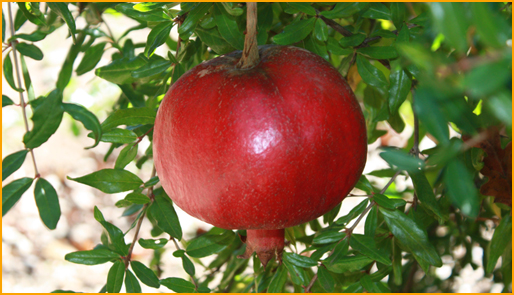Did you know? By Doctor Negar Tabatabaei, PhD

Food components
Nutrients and choices to make!
In addition, pomegranate is a rich source of phytochemicals (e.g. polyphenols) which contribute to the main anti-oxidant properties of this fruit (Orak, Yagar et al. 2012). These compounds mainly consist of tannins, flavonoids and anthocyanins which have shown to have beneficial effects on health (Orak, Yagar et al. 2012).
Health impacts of Pomegranate
Pomegranate juice or extracts have been suggested to have an inhibitory effect on prostate cancer tumors as shown in cell culture (Seeram, Aronson et al. 2007) and animal studies (Seeram, Aronson et al. 2007). In line with these preclinical studies, a human clinical trial (phase II) in California was performed on 46 men with a history of treatment of prostatic cancer with surgery or radiation to investigate the effect of consumption of pomegranate juice on the development of the disease.The results of this study suggested that consumption of a cup (8 oz) of pomegranate juice may delay the doubling of prostate-specific antigen (PSA) concentrations, a risk factor for prostatic cancer, from 15 mo. prior to treatment to 54 mo. post-treatment (Pantuck, Leppert et al. 2006).
There is scientific evidence on a potential protective effect of pomegranate juice and extracts on cardiovascular health. Men and women, 65-75 y with a history of carotid artery stenosis (CAS), a state of increased carotid intima-media thickness (IMT), were randomized to either receive pomegranate juice for a year (treatment; n=10) or placebo (control; n=9). The objective of the study was to look at the progression of carotid lesions and changes in oxidative stress and blood pressure between the treatment and control groups. Consumption of pomegranate juice (50 ml) for 1 y decreased carotid IMT (30 %), serum LDL susceptibility to oxidation (59%) and systolic blood pressure (12 %) (Aviram, Rosenblat et al. 2004). The later has been suggested to be through inhibition of serum angiotensin converting enzyme (ACE) activity by the anti-oxidant compounds in pomegranate (Stowe 2011). Most studies in this area were performed on small sample sizes suggesting the necessity for further studies in this filed.
Even though the main nutritious properties of pomegranate are reflected when ingested orally followed by its digestion in the gastrointestinal (GI) tract, scientists have suggested a protective role of pomegranate compounds early in the GI system and that is mouth hygiene and dental health. Healthy men and women (9-25 y old) were randomized to distilled water (negative control; n=20), standard mouth rinse (positive control; n=20) and pomegranate extracts (hydroalcoholic) (treatment; n=20). Dental plaques were collected from all subjects before and 1 min after rinsing the mouth with 15 ml of either of the compounds they were randomized to receive. The dental plaque microorganisms, expressed as colony forming units per milliliter (CFU/mL), decreased significantly after rinse with pomegranate extracts and the standard mouth rinse compounds, 84 % and 79 %, respectively (Menezes, Cordeiro et al. 2006). While rinsing with distilled water only decreased the microorganisms by 11 %. This suggests that leaving a taste of pomegranate extracts may be beneficial for your dental health! To your health; and the best tasting hot sauce!
References
- Morton, J. 1987. Pomegranate. p. 352–355. In: Fruits of warm climates. Julia F. Morton, Miami, FL.
- Adhami, V. M., N. Khan, et al. (2009). “Cancer chemoprevention by pomegranate: laboratory and clinical evidence.” Nutr Cancer 61(6): 811-815. doi: 810.1080/01635580903285064.
- Aviram, M., M. Rosenblat, et al. (2004). “Pomegranate juice consumption for 3 years by patients with carotid artery stenosis reduces common carotid intima-media thickness, blood pressure and LDL oxidation.” Clinical nutrition (Edinburgh, Scotland) 23(3): 423-433.
- Longtin, R. (2003). “The Pomegranate: Nature’s Power Fruit?” Journal of the National Cancer Institute 95(5): 346-348.
- Menezes, S., L. Cordeiro, et al. (2006). “Punica granatum (pomegranate) extract is active against dental plaque.” J Herb Pharmacother 6(2): 79-92.
- Orak, H., H. Yagar, et al. (2012). “Comparison of antioxidant activities of juice, peel, and seed of pomegranate (Punica granatum L.) and inter-relationships with total phenolic, Tannin, anthocyanin, and flavonoid contents.” Food Science and Biotechnology 21(2): 373-387.
- Pantuck, A. J., J. T. Leppert, et al. (2006). “Phase II Study of Pomegranate Juice for Men with Rising Prostate-Specific Antigen following Surgery or Radiation for Prostate Cancer.” Clinical Cancer Research 12(13): 4018-4026.
- Seeram, N. P., W. J. Aronson, et al. (2007). “Pomegranate Ellagitannin-Derived Metabolites Inhibit Prostate Cancer Growth and Localize to the Mouse Prostate Gland.” Journal of Agricultural and Food Chemistry 55(19): 7732-7737.
- Stowe, C. B. (2011). “The effects of pomegranate juice consumption on blood pressure and cardiovascular health.” Complementary therapies in clinical practice 17(2): 113-115.
